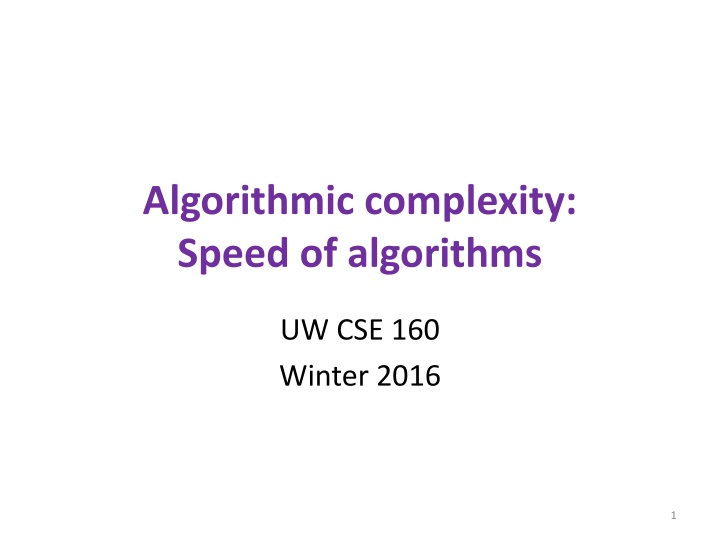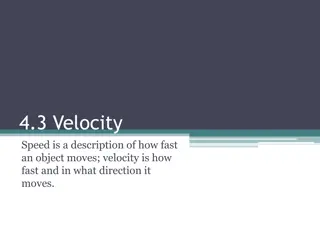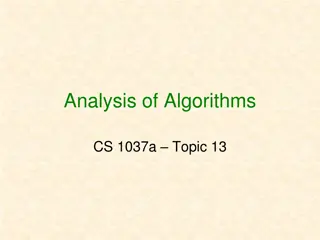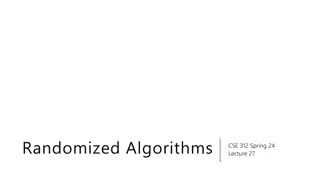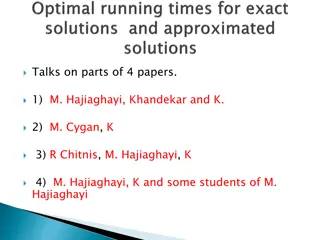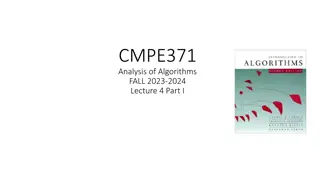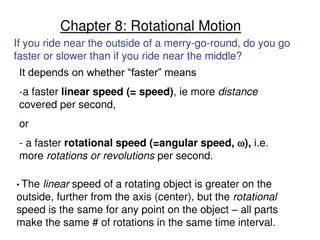Algorithmic complexity: Speed of algorithms
Explore the concept of algorithmic complexity and the speed of algorithms as covered in the UW CSE 160 course during the winter of 2016. Delve into the intricate analysis of algorithms and their performance to gain a deeper understanding of computational efficiency and problem-solving techniques.
Download Presentation

Please find below an Image/Link to download the presentation.
The content on the website is provided AS IS for your information and personal use only. It may not be sold, licensed, or shared on other websites without obtaining consent from the author.If you encounter any issues during the download, it is possible that the publisher has removed the file from their server.
You are allowed to download the files provided on this website for personal or commercial use, subject to the condition that they are used lawfully. All files are the property of their respective owners.
The content on the website is provided AS IS for your information and personal use only. It may not be sold, licensed, or shared on other websites without obtaining consent from the author.
E N D
Presentation Transcript
Algorithmic complexity: Speed of algorithms UW CSE 160 Winter 2016 1
How fast does your program run? Usually, this does not matter Correctness is more important than speed Computer time is much cheaper than human time The cost of your program depends on: Time to write and verify it High cost: salaries Time to run it Low cost: electricity An inefficient program may give you results faster 2
Sometimes, speed does matter Programs that need to run in real time E.g. will by car crash into the car in front of me? Very large datasets Even inefficient algorithms usually run quickly enough on a small dataset Example large data set: Google: 67 billion pages indexed (2014) 5.7 billion searches per day (2014) Number of pages searched per day?? 3
Program Performance We ll discuss two things a programmer can do to improve program performance: Good Coding Practices Good Algorithm Choice 4
Good Coding Practices (1) Minimize amount of work inside of loops y = 500 for i in range(n): z = expensive_function() x = 5.0 * y / 2.0 + z lst.append(x + i) Move computations that WILL NOT CHANGE outside/above the loop whenever possible. 5
Good Coding Practices (2) Minimize amount of work inside of loops for i in friends_of_friends(n): for j in friends_of_friends(n): # do stuff with i and j Move computations that WILL NOT CHANGE outside/above the loop whenever possible. 6
Good Coding Practices (3) Avoid iterating over data multiple times when possible for base in nucleotides: if base == 'A': # code here for base in nucleotides: if base == 'C': # code here for base in nucleotides: if base == 'T': # code here for base in nucleotides: if base == 'G': # code here for base in nucleotides: if base == 'A': # code here elif base == 'C': # code here elif base == 'T': # code here elif base == 'G': # code here Even without the loop, it is more efficient to use the if elif elif than multiple if statements (Potentially fewer cases will be checked with the elif option vs. the if option where all four options will always be checked.) 7
Good Coding Practices (4) Expensive operations: Reading files Writing files Printing to the screen Try to open the file once and read in all the data you need into a data structure. Accessing the data structure will be MUCH faster than reading the file a second time. 8
Testing and Developing your Program Test your program on a SMALL input file. This will allow you to calculate expected results by hand to check for correctness But it can also make your development process easier if you have to wait a shorter time for your program to run 9
Good Algorithm Choice Good choice of algorithm can have a much bigger impact on performance than the good coding practices mentioned. However good coding practices can be applied fairly easily Trying to come up with a better algorithm can be a (fun!) challenge Remember: Correctness is more important than speed!! 10
How to compare two algorithms? Implement them both in Python Run them and time them 11
A Better Way to Compare Two Algorithms Hardware? Count number of operations something independent of speed of processor Properties of data set? (e.g. almost sorted, all one value, reverse sorted order) Pick the worst possible data set: gives you an upper bound on how long the algorithm will take Also it can be hard to decide on what is and average data set Size of data set? Describe running time of algorithm as a function of data set size 12
Asymptotic Analysis Comparing Orders of Growth This approach works when problem size is large When problem size is small, constant factors matter A few common Orders of Growth: Constant O(1) Linear O(n) Quadratic O(n2) Example: integer + integer iterating through a list iterating through a grid 13
Which Function Grows Faster? O(n3) O(n2) vs. n3 + 2n2 100n2 + 1000 n n 14
Running Times of Python Operations Constant Time operations: O(1) Basic Math on numbers (+ - * /) Indexing into a sequence (eg. list, string, tuple) or dictionary E.g. myList[3] = 25 List operations: append, pop(at end of list) Sequence operation: len Dictionary operation: in Set operations: in, add, remove, len Linear Time operations: O(n) for loop traversing an entire sequence or dictionary Built in functions: sum, min, max, slicing a sequence Sequence operations:in, index, count Dictionary operations: keys(), values(), items() Set operations: &, |, - String concatenation (linear in length of strings) Note: These are general guidelines, may vary, or may have a more costly worst case. Built in functions (e.g. sum, max, min, sort) are often faster than implementing them yourself. 15
Example: Processing pairs def make_pairs(list1, list2): """Return a list of pairs. Each pair is made of corresponding elements of list1 and list2. list1 and list2 must be of the same length.""" assert make_pairs([100, 200, 300], [101, 201, 301]) == [[100, 101], [200, 201], [300, 301]] 2 nested loops vs. 1 loop Quadratic (n2) vs. linear (n) time 16
Example: Searching def search(value, lst): """Return index of value in list lst. The value must be in the list.""" Any list vs. a sorted list Linear (n) vs. logarithmic (log n) time 17
Example: Sorting def sort(lst): """Return a sorted version of the list lst. The input list is not modified.""" assert sort([3, 1, 4, 1, 5, 9, 2, 6, 5]) == [1, 1, 2, 3, 4, 5, 5, 6, 9] selection sort vs. quicksort 2 nested loops vs. recursive decomposition time: quadratic (n2) vs. log-linear (n log n) time Note: Calling built in sorting methods sort or sorted in Python has O(n log n) time 18
